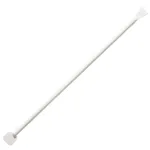
Thermo Fisher Scientific TCR beta Monoclonal Antibody (H57-597), PE-eFluor 610, eBioscience
✨AI 추천 연관 상품
AI가 분석한 이 상품과 연관된 추천 상품들을 확인해보세요
연관 상품을 찾고 있습니다...
Applications
Tested Dilution
Publications
Flow Cytometry (Flow)
0.25 µg/test
View 19 publications 19 publications
Product Specifications
Published species
Human, Mouse
Host/Isotype
Armenian hamster / IgG
Recommended Isotype Control
Armenian Hamster IgG Isotype Control (eBio299Arm), PE-eFluor™ 610, eBioscience™
Class
Monoclonal
Type
Antibody
Clone
H57-597
Conjugate
PE-eFluor™ 610 PE-eFluor™ 610 PE-eFluor™ 610
View additional formats
- Unconjugated
- Alexa Fluor 532
- Alexa Fluor 700
- APC
- APC-eFluor 780
- Biotin
- Brilliant UV 496
- Brilliant UV 661
- Brilliant UV 737
- Brilliant Violet 421
- eFluor 450
- eFluor 506
- FITC
- Functional Grade
- NovaFluor Blue 510
- NovaFluor Blue 530
- NovaFluor Blue 610-70S
- NovaFluor Blue 660-120S
- NovaFluor Blue 725
- NovaFluor Blue 800
- NovaFluor UV 765
- NovaFluor Violet 690
- NovaFluor Violet 800
- NovaFluor Yellow 810
- PE
- PE-Cyanine5
- PE-Cyanine7
- PerCP-Cyanine5.5
- Super Bright 600
- Super Bright 645
- Super Bright 702
- Super Bright 780
- Request custom conjugation
Excitation/Emission Max
565/606 nm View spectra 
Form
Liquid
Concentration
0.2 mg/mL
Storage conditions
4° C, store in dark, DO NOT FREEZE!
Shipping conditions
Wet ice
RRID
AB_2574643
Product Specific Information
Description: The H57-597 monoclonal antibody reacts with the beta chain of mouse TCR. TCR beta is expressed by thymocytes in a developmentally regulated manner and a majority of peripheral T cells. Crosslinking of the TCR complex with H57-597 induces activation and proliferation of T cells or apoptosis based on assay conditions. H57-597 is used as a phenotypic marker for TCR beta expressing T cells.
Applications Reported: This H57-597 antibody has been reported for use in flow cytometric analysis.
Applications Tested: This H57-597 antibody has been tested by flow cytometric analysis of mouse splenocytes. This can be used at less than or equal to 0.25 µg per test. A test is defined as the amount (µg) of antibody that will stain a cell sample in a final volume of 100 µL. Cell number should be determined empirically but can range from 10^5 to 10^8 cells/test. It is recommended that the antibody be carefully titrated for optimal performance in the assay of interest.
PE-eFluor® 610 can be excited with laser lines from 488-561 nm and emits at 607 nm. We recommend using a 610/20 band pass filter (equivalent to PE-Texas Red®). Please make sure that your instrument is capable of detecting this fluorochome.
Light sensitivity: This tandem dye is sensitive to photo-induced oxidation. Please protect this vial and stained samples from light.
Fixation: Samples can be stored in IC Fixation Buffer (Product # 00-8222) (100 µL of cell sample + 100 µL of IC Fixation Buffer) or 1-step Fix/Lyse Solution (Product # 00-5333) for up to 3 days in the dark at 4°C with minimal impact on brightness and FRET efficiency/compensation. Some generalizations regarding fluorophore performance after fixation can be made, but clone specific performance should be determined empirically.
Excitation: 488-561 nm; Emission: 607 nm; Laser: Blue Laser, Green Laser, Yellow-Green Laser.
Filtration: 0.2 µm post-manufacturing filtered.
Target Information
The ability of T cell receptors (TCR) to discriminate foreign from self-peptides presented by major histocompatibility complex (MHC) class II molecules is essential for an effective adaptive immune response. TCR recognition of self-peptides has been linked to autoimmune disease. Mutant self-peptides have been associated with tumors. Engagement of TCRs by a family of bacterial toxins know as superantigens has been responsible for toxic shock syndrome. Autoantibodies to V beta segments of T cell receptors have been isolated from patients with rheumatoid arthritis (RA) and systemic lupus erythematosus (SLE). The autoantibodies block TH1-mediated inflammatory autodestructive reactions and are believed to be a method by which the immune system compensates for disease (ref5). T Cell and TCR Diversity Most human T cells express the TCR alpha-beta and either CD4 or CD8 molecule (single positive, SP). A small number of T cells lack both CD4 and CD8 (double negative, DN). Increased percentages of alpha-beta DN T cells have been identified in some autoimmune and immunodeficiency disorders. Gamma-delta T cells are primarily found within the epithelium. They show less TCR diversity and recognize antigens differently than alpha-beta T cells. Subsets of gamma-delta T cells have shown antitumor and immunoregulatory activity.
For Research Use Only. Not for use in diagnostic procedures. Not for resale without express authorization.
🏷️Thermo Fisher Scientific 상품 둘러보기
동일 브랜드의 다른 상품들을 확인해보세요

Thermo Fisher Scientific
Thermo Fisher Scientific Nalgene Polypropylene Stirring Rod
38,900원

Thermo Fisher Scientific
Thermo Fisher Scientific Nalgene Polypropylene Stirring Rod
199,300원

Thermo Fisher Scientific
Thermo Fisher Scientific TCR beta Monoclonal Antibody (H57-597), PE-eFluor 610, eBioscience
204,700원

Thermo Fisher Scientific
Thermo Fisher Scientific TER-119 Monoclonal Antibody (TER-119), PE-eFluor 610, eBioscience
181,700원

Thermo Fisher Scientific
Thermo Fisher Scientific iNOS Monoclonal Antibody (CXNFT), PE-eFluor 610, eBioscience
314,800원
배송/결제/교환/반품 안내
배송 정보
| 기본 배송비 |
| 교환/반품 배송비 |
|
|---|---|---|---|
| 착불 배송비 |
| ||
| 교환/반품 배송비 |
| ||
결제 및 환불 안내
| 결제수단 |
|
|---|---|
| 취소 |
|
| 반품 |
|
| 환급 |
|
교환 및 반품 접수
| 교환 및 반품 접수 기한 |
|
|---|---|
| 교환 및 반품 접수가 가능한 경우 |
|
| 교환 및 반품 접수가 불가능한 경우 |
|
교환 및 반품 신청
| 교환 절차 |
|
|---|---|
| 반품 절차 |
|
